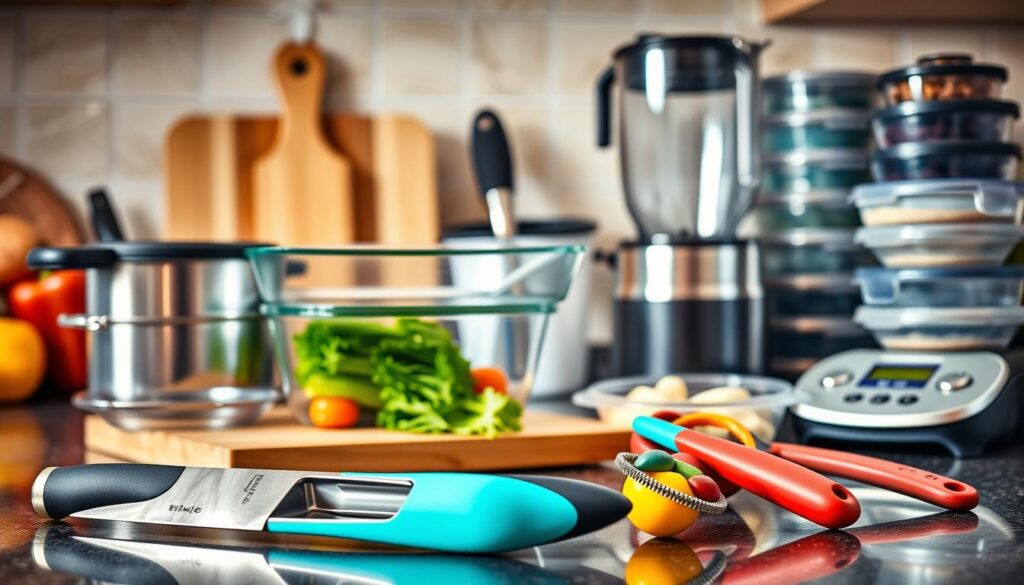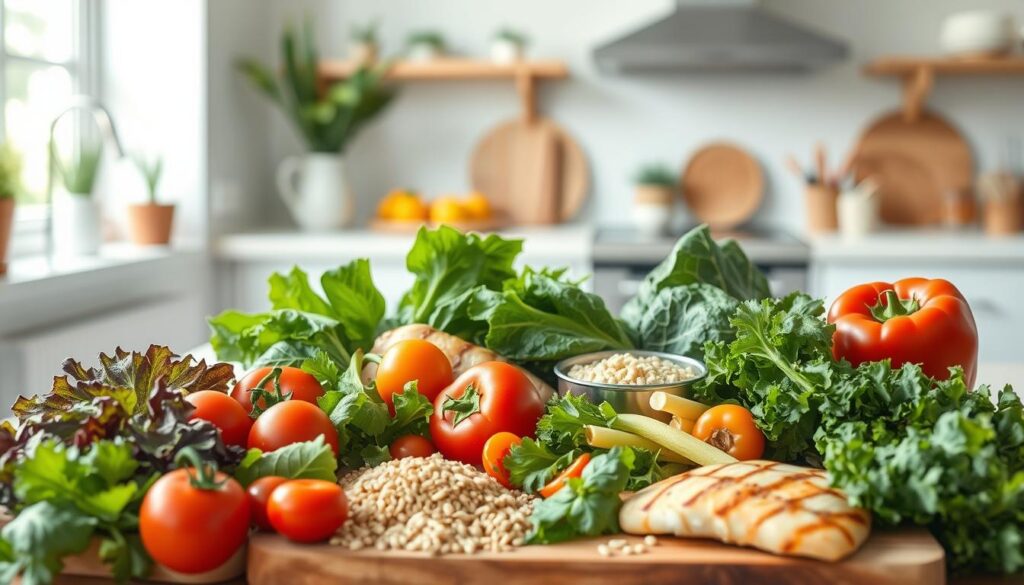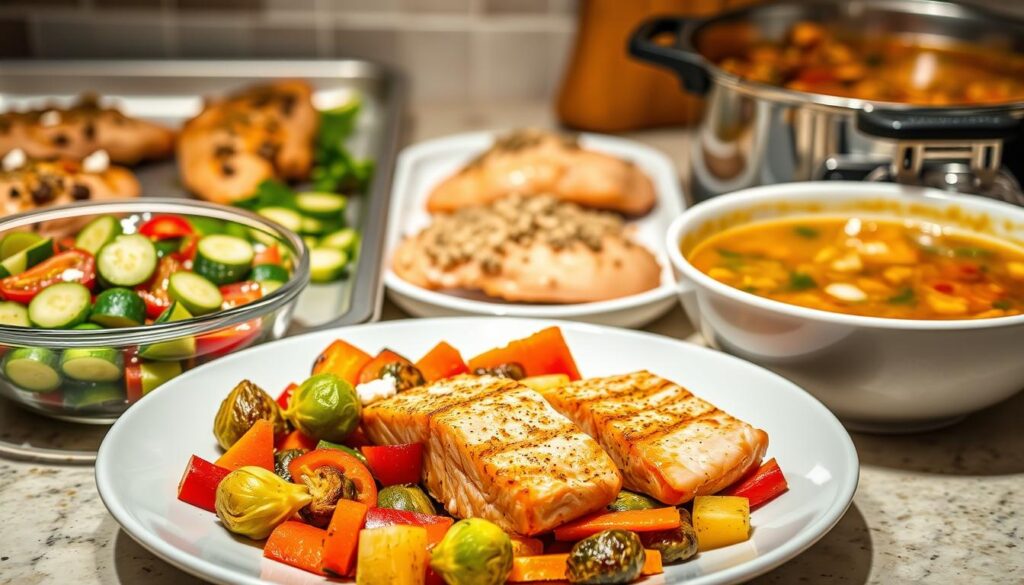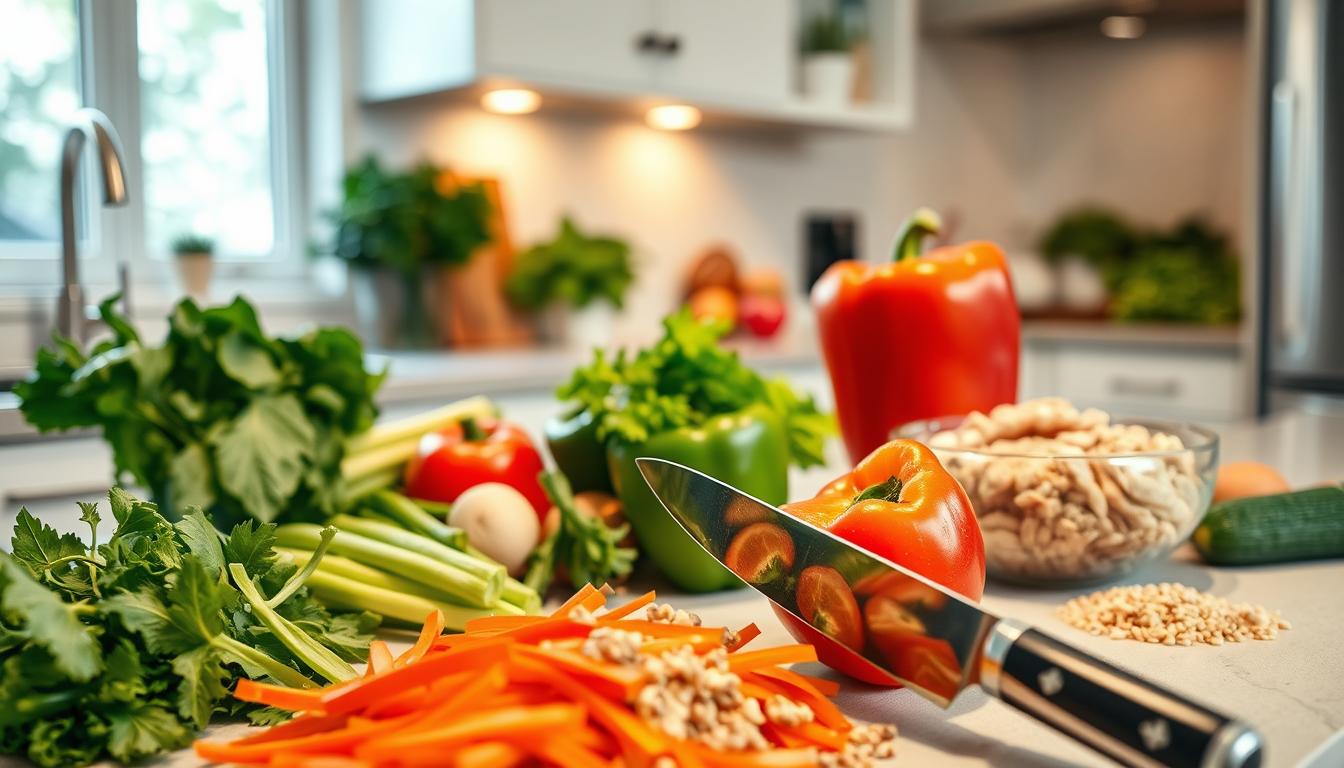Busy weeknights can be challenging, especially when it comes to getting a healthy dinner on the table quickly. With increasingly hectic schedules, it’s easy to resort to fast food or processed meals. However, with a few simple strategies, you can enjoy a nutritious meal in just 30 minutes.
Having a quick dinner option that’s both healthy and delicious is a game-changer for families and individuals alike. It’s not just about saving time; it’s about making mealtime more enjoyable and less stressful. In this article, we’ll explore some fantastic weeknight dinners that can be prepared in no time.
Key Takeaways
- Simple strategies for a healthy dinner in 30 minutes
- Quick dinner options that are nutritious and delicious
- Ideas for making mealtime less stressful
- Tips for busy weeknights
- Healthy meal planning made easy
The Challenge of Quick and Healthy Meals
Creating healthy meals in a short amount of time is a challenge that many home cooks encounter regularly. With increasingly busy lifestyles, finding the time and energy to prepare nutritious meals can be daunting. However, the importance of healthy eating cannot be overstated, especially when it comes to evening meals that help us recharge for the next day.
Why We Struggle with Weeknight Dinners
One of the main reasons people struggle with weeknight dinners is the lack of time. After a long day, the last thing many want to do is spend a lot of time in the kitchen. This is where easy recipes come into play, providing simple solutions for clean eating without spending hours cooking.
The Importance of Nutritious Evening Meals
Nutritious meals are crucial for maintaining health and energy levels. Evening meals, in particular, play a significant role in helping our bodies recover from the day’s activities and prepare for the next day. Incorporating a balance of macronutrients and essential vitamins and minerals is key to a healthy diet.
Benefits of 30-Minute Meal Solutions
One of the most effective ways to ensure healthy eating on busy weeknights is by opting for 30-minute meal solutions. These quick meals allow for clean eating without the need for extensive preparation or cooking times. By choosing recipes that can be prepared and cooked within 30 minutes, individuals can enjoy healthy, home-cooked meals even on the busiest of days.
Planning for Success: Meal Prep Strategies
To cook healthy dinners quickly, a solid meal prep strategy is essential. Meal preparation involves planning, shopping, and cooking in a way that saves time and ensures nutritious meals.
Weekly Meal Planning Basics
Effective meal planning starts with creating a schedule. This helps in organizing meals around your busy week.
Creating a Flexible Meal Calendar
A flexible meal calendar allows you to plan meals for the week while leaving room for spontaneity or changes based on your schedule or preferences. It’s about finding a balance between planning and flexibility.
Building a Recipe Collection
Having a collection of simple, healthy recipes is crucial. It ensures you have a variety of simple meal ideas to choose from, reducing the likelihood of meal repetition and boredom.
Smart Grocery Shopping Tips
Grocery shopping is a critical step in meal prep. Making a list based on your meal plan helps avoid impulse buys and ensures you have the necessary ingredients. Shopping for seasonal produce can also be cost-effective and ensures freshness.
Time-Saving Kitchen Tools
The right kitchen tools can significantly reduce meal prep time. Here are some essentials:

| Tool | Use |
|---|---|
| Slow Cooker | Cooks meals while you’re busy |
| Food Processor | Chops, slices, and purees ingredients quickly |
| Instant Pot | Pressure cooks meals, significantly reducing cooking time |
Investing in these kitchen tools can make a significant difference in your meal prep efficiency.
Nutritional Foundations of a Healthy Dinner
A healthy dinner is not just about saving time; it’s about nourishing your body with the right foods. Understanding the nutritional foundations of a meal is crucial for maintaining overall health and achieving a balanced diet.
Balancing Macronutrients
Balancing macronutrients is essential for a healthy dinner. This involves understanding the right mix of protein, healthy fats, and carbohydrates.
Protein Requirements
Protein is a vital component of a healthy dinner, aiding in muscle repair and growth. The recommended daily intake of protein varies based on factors such as age, sex, and activity level. Generally, 0.8 grams of protein per kilogram of body weight is recommended for adults.
Healthy Fats and Carbohydrates
Healthy fats, such as those found in nuts and avocados, are crucial for brain health and absorbing vitamins. Carbohydrates, especially whole grains, provide energy and fiber. A balanced dinner should include a mix of these macronutrients.
Incorporating Essential Vitamins and Minerals
Besides macronutrients, vitamins and minerals play a significant role in maintaining health. Foods rich in vitamin C, like citrus fruits, and iron, like lean meats, should be included in a healthy dinner.
Portion Control Guidelines
Portion control is key to maintaining a balanced diet. Using smaller plates and being mindful of serving sizes can help. A general guideline is to fill half your plate with vegetables, a quarter with protein, and a quarter with carbohydrates.
| Nutrient | Recommended Portion | Examples |
|---|---|---|
| Protein | 3-4 ounces | Chicken breast, fish, tofu |
| Vegetables | 1-2 cups | Broccoli, spinach, bell peppers |
| Carbohydrates | 1/2 cup cooked | Brown rice, quinoa, whole wheat bread |

By focusing on these nutritional foundations, you can create healthy dinners that are both quick and nutritious.
10 Essential Ingredients for Quick Healthy Dinners
The secret to whipping up a nutritious dinner quickly lies in the ingredients you choose. Having the right staples in your pantry and fridge can make all the difference in preparing quick dinner options that are both healthy and delicious.
Protein Options That Cook Quickly
Protein is a crucial component of a satisfying dinner. Opt for proteins that cook quickly, such as chicken breast, turkey sausages, or tofu. These can be prepared in under 10 minutes, making them ideal for quick dinner options.
Other fast-cooking proteins include shrimp, scallops, and lean beef strips. These not only save time but also provide a good source of essential nutrients.
Versatile Vegetables for Fast Meals
Vegetables are a vital part of a healthy dinner. Choose versatile options like broccoli, bell peppers, and spinach that can be cooked in various ways and pair well with different proteins. These healthy ingredients can be steamed, roasted, or sautéed in minutes.
Healthy Carbohydrate Choices
Carbohydrates provide energy and help round out a meal. Opt for whole grains like quinoa, brown rice, and whole wheat pasta. These healthy ingredients are not only nutritious but also relatively quick to cook.
Flavor Boosters and Seasonings
To add flavor to your meals without extra salt or sugar, rely on flavor boosters like herbs, spices, and marinades. These ingredients can elevate the taste of your dishes without compromising their nutritional value.
Herbs, Spices, and Marinades
Herbs like basil and cilantro, spices such as cumin and paprika, and marinades made with olive oil and lemon juice can add depth and complexity to your meals. Experiment with different combinations to find your favorite flavor boosters.
Healthy Sauce Alternatives
Instead of relying on store-bought sauces that are often high in sugar and preservatives, make your own using healthy ingredients. Use Greek yogurt, tomato sauce, or avocado as bases for your sauces.
Healthy Dinner Ideas Ready in 30 Minutes or Less
Quick, healthy dinners are within reach with these easy-to-make recipes that won’t compromise on nutrition. In today’s fast-paced world, finding time to cook a healthy meal can be challenging. However, with the right recipes, you can enjoy a delicious and nutritious dinner in no time.

One-Pan Mediterranean Chicken and Vegetables
This recipe is a perfect example of a healthy dinner idea that is both easy to prepare and packed with nutrients. The combination of chicken breast, mixed vegetables, and Mediterranean spices creates a flavorful dish that is sure to please.
Step-by-Step Preparation
- Season the chicken breast with salt, pepper, and Mediterranean herbs.
- Heat olive oil in a large pan over medium-high heat.
- Add the chicken and cook until browned on both sides.
- Add your choice of vegetables (such as bell peppers, zucchini, and cherry tomatoes) to the pan.
- Cook until the vegetables are tender and the chicken is cooked through.
Nutritional Benefits
This dish is rich in protein from the chicken and packed with vitamins and minerals from the variety of vegetables. The use of olive oil adds healthy fats, making this a well-rounded meal.
Quick Salmon with Roasted Vegetables
Salmon is an excellent source of omega-3 fatty acids, which are crucial for heart health. Pairing it with roasted vegetables makes for a nutritious and filling dinner.
To prepare, season the salmon fillet with lemon juice and herbs, and roast in the oven with your choice of vegetables (such as asparagus and Brussels sprouts) until cooked through.
Vegetarian Stir-Fry with Tofu
For a vegetarian option, a stir-fry with tofu and mixed vegetables is a quick and nutritious choice. Use a variety of colorful vegetables to ensure a broad intake of vitamins and minerals.
Tofu is an excellent source of protein, making this dish suitable for vegetarians and vegans alike.
Lean Beef and Broccoli Bowl
This recipe is a healthy twist on a classic. Using lean beef and plenty of broccoli, this dish is high in protein and fiber.
Simply slice the lean beef into thin strips and stir-fry with broccoli and your choice of seasonings. Serve over brown rice or quinoa for a filling meal.
Shrimp and Quinoa Skillet
Shrimp cooks quickly, making it an ideal choice for a 30-minute dinner. Paired with quinoa and vegetables, this skillet meal is both nutritious and satisfying.
Cook the shrimp with garlic and lemon, then serve over quinoa with your choice of steamed vegetables.
These healthy dinner ideas prove that you don’t have to sacrifice nutrition for convenience. With a little planning, you can enjoy a variety of delicious and healthy meals in 30 minutes or less.
Time-Saving Cooking Techniques
Mastering time-saving cooking techniques is essential for preparing healthy dinners quickly. By implementing a few strategic methods, you can significantly reduce your cooking time without compromising on nutrition or flavor.
Efficient Chopping and Prep Methods
Efficient chopping and preparation are crucial for saving time in the kitchen. Using sharp knives and learning various chopping techniques can make a big difference. Additionally, preparing ingredients in advance, such as chopping vegetables or marinating proteins, can streamline your cooking process.
Multi-Tasking in the Kitchen
Multi-tasking is a valuable skill when cooking under time pressure. This involves timing different components of your meal to finish cooking simultaneously. For example, you can start by boiling water for rice while sautéing vegetables in a pan. Workflow organization is also key; keep frequently used utensils and ingredients within easy reach to minimize delays.
Timing Different Components
To achieve perfect timing, create a mental or written timeline of your cooking tasks. Identify which components can be cooked simultaneously and which need to be done sequentially.
Workflow Organization
Organizing your kitchen workflow can significantly enhance your efficiency. This includes arranging your cooking stations, having the right tools at hand, and maintaining a clean workspace.
One-Pot and Sheet Pan Cooking
One-pot and sheet pan cooking are excellent methods for reducing cooking time and cleanup. These techniques allow you to cook entire meals in a single vessel or on a single pan, minimizing the need for multiple pots and pans.
Using Kitchen Appliances Strategically
Utilizing kitchen appliances such as slow cookers, instant pots, and food processors can greatly reduce cooking time. These appliances are designed to perform specific tasks efficiently, allowing you to prepare complex meals quickly.
| Cooking Technique | Time Saved | Benefits |
|---|---|---|
| Efficient Chopping | 10-15 minutes | Reduces prep time, enhances safety |
| One-Pot Cooking | 20-30 minutes | Less cleanup, simplified cooking |
| Using Kitchen Appliances | 30-60 minutes | Increases efficiency, reduces labor |
Adapting Recipes for Dietary Restrictions
Dietary restrictions don’t have to limit your culinary creativity; learn how to adapt your favorite recipes. Whether you’re cooking for yourself or others, understanding how to adjust recipes for dietary needs is invaluable. This section will guide you through modifying recipes to accommodate various dietary requirements.
Gluten-Free Modifications
For those who require a gluten-free diet, substituting gluten-containing ingredients is essential. Use gluten-free flours like almond or coconut flour for baking, and be cautious of cross-contamination.
Dairy-Free Alternatives
Individuals with dairy intolerance or preference can opt for dairy-free alternatives like almond milk, soy milk, or coconut yogurt. These substitutes work well in both sweet and savory dishes.
Low-Carb and Keto-Friendly Options
For those on a low-carb or keto diet, reducing carbohydrate intake is crucial. Replace high-carb ingredients with low-carb alternatives like cauliflower rice or zucchini noodles.
Plant-Based Substitutions
Plant-based diets are becoming increasingly popular, and making plant-based substitutions is easier than ever. Here are some key substitutions:
Meat Alternatives
Tofu, tempeh, and seitan are excellent protein sources that can replace meat in many dishes. They absorb flavors well and can be marinated for added taste.
Vegan Protein Sources
Legumes, lentils, and chickpeas are not only rich in protein but also in fiber and essential nutrients. Incorporate these into your meals for a nutritious and filling diet.
By applying these adaptations, you can enjoy a diverse range of meals that cater to different dietary needs. Experiment with new ingredients and recipes to keep your meals exciting and inclusive.
Family-Friendly Healthy Dinner Ideas
Finding dinner ideas that your kids will love and that are good for them is a top priority for many families. Creating meals that are both nutritious and appealing to children can be challenging, but with a few strategies, you can make healthy dinners a success.
Kid-Approved Nutritious Meals
One way to ensure that your kids will enjoy a healthy dinner is to involve them in the meal planning process. Let them help with choosing recipes or picking out vegetables at the grocery store. Meals like chicken tenders with dipping sauce, veggie pizzas, or tacos are often hits with kids and can be made healthier with a few simple tweaks.
Customizable Dinner Stations
Setting up customizable dinner stations can make mealtime more engaging and allow each family member to tailor their meal to their tastes. For example, a taco bar with lean ground beef, lettuce, tomatoes, and low-fat cheese lets everyone create their own healthy tacos. This approach not only makes dinner more fun but also encourages healthy eating habits.
Sneaking in Extra Vegetables
Sneaking extra vegetables into meals is a great way to boost nutrition without changing the flavor profile that your family enjoys. Grating vegetables like carrots or zucchini into sauces, meatballs, or burgers is an effective method. You can also add finely chopped veggies to omelets or scrambled eggs.
Batch Cooking for Busy Families
Batch cooking is a lifesaver for busy families. By preparing large batches of a single ingredient or an entire meal, you can save time during the week when schedules get hectic. Batch-cooked meals like soups, stews, or casseroles can be refrigerated or frozen for later use, making healthy dinners possible even on the busiest nights.
By incorporating these strategies into your meal planning routine, you can create a repertoire of family-friendly healthy dinner ideas that everyone will enjoy.
Conclusion: Making Healthy 30-Minute Dinners a Habit
Creating a routine of healthy 30-minute dinners can be a game-changer for busy households. By incorporating simple meal ideas and focusing on clean eating, you can nourish your family without sacrificing flavor or spending hours in the kitchen.
The key to success lies in planning and consistency. By applying the meal prep strategies, nutritional foundations, and time-saving cooking techniques outlined in the previous sections, you can make healthy dinner ideas a staple in your daily routine.
Start by selecting a few simple meal ideas that your family enjoys and build from there. Experiment with new ingredients and recipes to keep mealtime interesting. As you make clean eating a habit, you’ll not only improve your health but also create lasting memories around the dinner table.
By embracing the principles outlined in this article, you’ll be well on your way to making healthy 30-minute dinners a sustainable part of your lifestyle.

